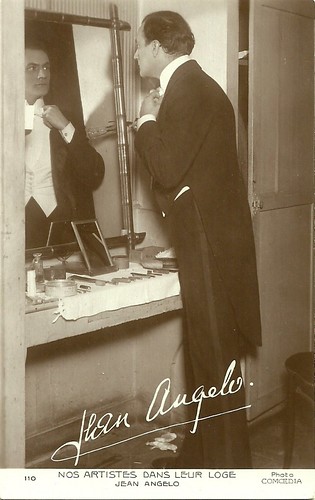
French postcard in the Nos artistes dans leur loge series by Editions La Fayette, Paris, no. 110. Photo: Comoedia.
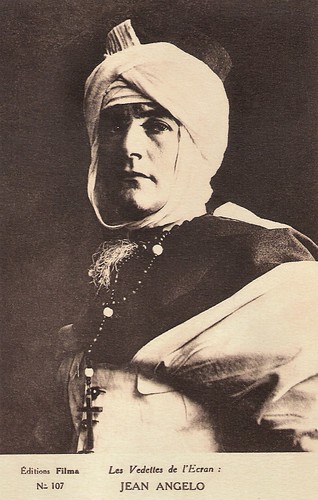
French postcard by Editions Film, in Les Vedettes de l'Ecran series, no. 107. Publicity still for L’Atlantide/Lost Atlantis (Jacques Feyder, 1922).
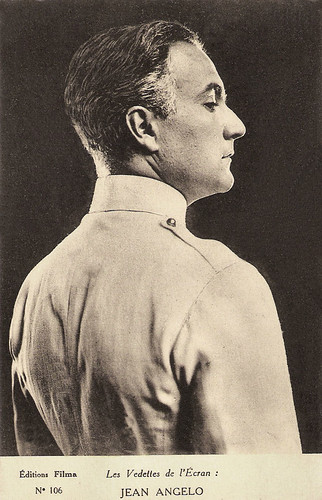
French postcard by Editions Filma, no. 106. Caption: Les Vedettes de l'Ecran: Jean Angelo. Looks like Angelo's colonial outfit in L'Atlantide (Jacques Feyder, 1921).
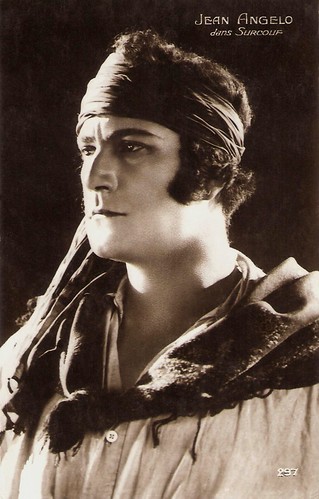
French postcard by Cinémagazine-Edition, Paris, no. 297. Photo: publicity still for Surcouf (Luitz-Morat, 1925).
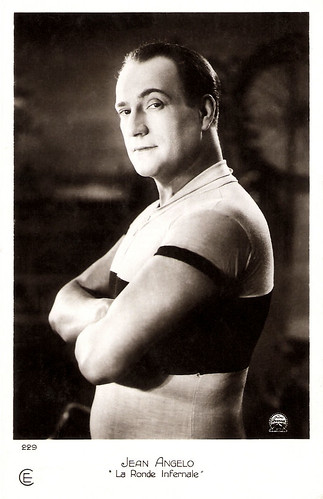
French postcard by Cinémagazine-Edition, Paris, no. 229. Photo: Paramount. Publicity still for La Ronde Infernale (1928).
A respectable and commercially viable industry
Jean Angelo was born Jean Jacques Barthelemy in Paris, France in 1875. IMDb notes 1875; according to Ciné-Artistes, it is 1888. In 1903, he made his stage debut in Lucrèce Borgia under the guidance of the great stage actress Sarah Bernhardt. He made his film debut in 1908.
That year he appeared in the short film L'Assassinat de Duc de Guise/The Assassination of the Duke de Guise (André Calmettes, Charles Le Bargy, 1908). This prestigious Film d’Art production reunited several leading figures of the French theatre, such as Charles Le Bargy, Albert Lambert and Gabrielle Robinne of the Comédie-Française. The acting, the photography and the set design are impressive for the period, as is the music by Camille Saint-Saëns, which was written especially for the film.
James Travers at Films de France writes: “L’Assassinat du Duc de Guise is a film of immense historic importance. One of the first films to use the narrative form, it proved to be an immense international success for its production company, Film d’Art, and, by dint of its popularity, helped to propel cinema from its early pioneering endeavours into a respectable and commercial viable industry.”
Angelo was discovered by director Albert Capellani. Together they made several films, including the Victor Hugo adaptation Notre Dame de Paris/The Hunchback of Notre Dame (Albert Capellani, 1911) starring Henry Krauss as Quasimodo, and the four-part serial Les Misérables (Albert Capellani, 1913) with Henry Krauss as Jean Valjean and Mistinguett as Éponine Thénardier. Angelo also played a supporting part in the serial Les Mystères de Paris/The Mysteries of Paris (Albert Capellani, 1911) starring Paul Capellani. The First World War interrupted his career. In 1914 he abandoned the film sets for the battlefield, and went to fight. He returned with combat injuries.
In 1917 he contributed to the war propaganda film Mères françaises/Mothers of France (René Hervil, Louis Mercanton, 1917), starring Sarah Bernhardt. That year Angelo also went to the US to perform at Fort Lee, New Jersey, in the World Film production The Divine Sacrifice (George Archainbaud, 1918). It was Angelo’s first major role, and also his only American performance. He returned to France before the war was over, to play in the Pathé production L’expiation/The Expiation (Camille de Morlhon, 1918), adapted from Guy de Maupassant and starring Gabrielle Robinne. In 1920 he starred in Les chères images/The expensive images (André Hugon, 1920) costarring Maxa.

French postcard for the Louis Aubert production L'Atlantide (1921) by Jacques Feyder, based on the novel by Pierre Benoit. The card depicts the French captain Morhange (Jean Angelo) received by the mysterious and cruel desert queen Antinéa (Stacia Napierkowska). The sets were by Manuel Orazi.
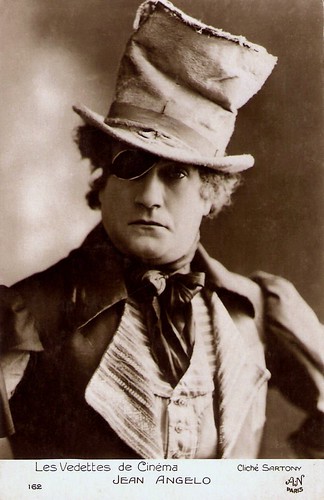
French postcard in the Les vedettes de Cinema series by A.N., Paris, no. 162. Photo: Sartony.

French postcard in the Les vedettes de Cinema series by A.N., Paris, no. 163. Photo: Sartony.
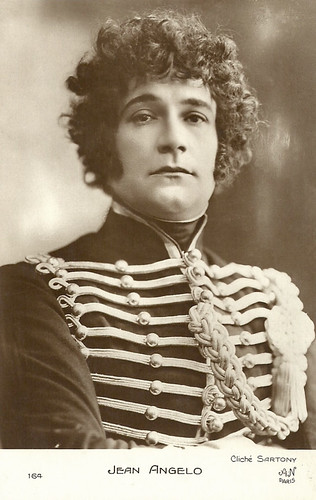
French postcard by A.N., Paris, no. 164. Photo: Sartony.

Probably Croatian postcard, dated 27-4-1927, editor unknown. Photo: Films Albatros. Jean Angelo and Nathalie Kovanko in Le prince charmant/Prince Charming (Viktor Tourjansky, 1925). We are unsure about this identification, as most reference works don't list Angelo as being part of the cast of this film.
Superstar in silent film
In the 1920s, Jean Angelo became a superstar in silent film. He was the ultimate leading man: distinguished, attractive, athletic, virile and powerful. He was a brilliant fencer, and he became the hero of several successful adventure films. He played Captain Morhange in L'Atlantide/Lost Atlantis (Jacques Feyder, 1921) with Georges Melchior and Stacia Napierkowska as the ageless queen Antinéa.
James Travers reviews: “Jacques Feyder’s first notable film was this grand adaptation of Pierre Benoît’s controversial and popular novel of the same title. What is most striking about this film is its truly epic scale. With most of the film shot on location in the Sahara desert – an extraordinary achievement for the time – L’Atlantide has a breathtaking realist feel that is almost unique in silent cinema.”
In 1924, Angelo played the legendary Corsair Surcouf, the intrepid sailor who fought the British marines, in the historical adventure serial Surcouf (Luitz-Morat, 1924). That same year he also played the role of the crook Robert Macaire in Les Aventures de Robert Macaire/The Adventures of Robert Macaire (Jean Epstein, 1925) opposite Suzanne Bianchetti.
Jean Renoir then called on him for his second film, the silent masterpiece Nana (Jean Renoir, 1926). In this lavish and fairly faithful adaptation of Emile Zola’s classic novel, Angelo played one of the love-struck admirers of Nana (Catherine Hessling - Renoir’s wife at the time). Angelo was very at ease in these period films, and quickly he became very popular, despite his very stylized acting style, which may seem old-fashioned and theatrical today.
Another success was his role as Edmond Dantes, a naval officer betrayed by his friends and falsely imprisoned at the Chateau d'If, in Monte Cristo (Henri Fescourt, 1928). At CineArtistes, Simon Benattar-Bourgeay writes: “This superb adaptation, benefited from a huge budget, and still strikes today by the sumptuousness of its staging and the refinement of its images. Again, Jean Angelo made a strong impression and the actor fills the screen. More than his co-stars Lil Dagover and Gaston Modot, he here confirms his status as a great romantic actor. His fame was at its height.”
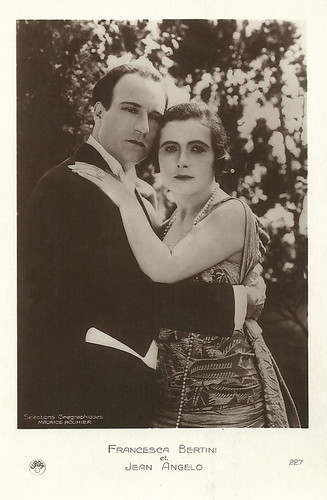
French postcard by Sélections Cinégraphiques Maurice Rouhier, no. 227. Photo: Europe Film. Jean Angelo and Francesca Bertini in the late silent film La fin de Monte-Carlo (Henri Etievant, Mario Nalpas, 1927).
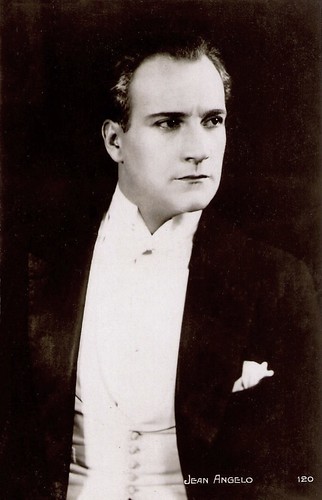
French postcard by Cinemagazine-Edition, Paris, no. 120.
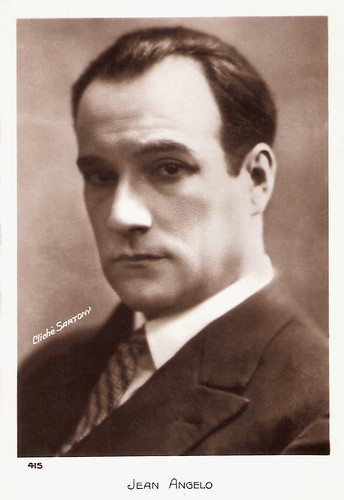
French postcard by Cinemagazine-Edition, Paris, no. 415. Photo: Sartony.
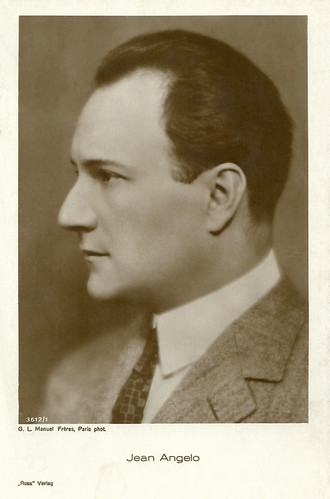
German postcard by Ross Verlag, no. 3612/1, 1928-1929. Photo: G.L. Manuel Frères, Paris.
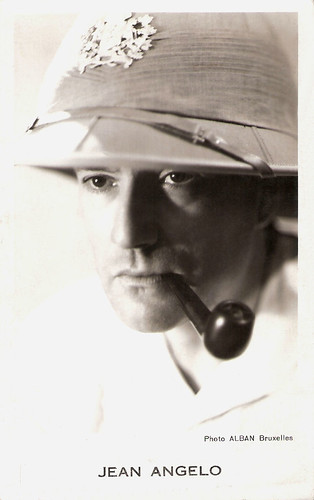
British postcard. Photo: Alban, Bruxelles.
A compelling film with a strong visual style
The arrival of sound, somewhat hampered Jean Angelo’s film career. France shifted to sound around 1929-1930. Angelo's first sound film was Mon coeur incognito/My Heart incognito (Manfred Noa, André-Paul Antoine, 1930), a Franco-German production co-starring Florelle, Tréville, and Mady Christians. The film, shot at the Aafa studios in Berlin, had its premiere at the Paris Moulin Rouge in 1930.
Angelo was one of the numerous actors who was not comfortable with sound film. His acting became less powerful. This did not prevent him from continuing to make films. In 1932, he played for the second time Captain Morhange in L'Atlantide/Lost Atlantis (G.W. Pabst, 1932).
James Travers: “Although considerably less polished and memorable than some of Pabst’s other works, L’Atlantide is a compelling film with a strong visual style throughout. The film is a remake of Jacques Feyder’s 1921 adaptation of Pierre Benoît’s novel, with some striking differences, particularly in the portrayal of Queen Antinea (Brigitte Helm). As was the case with Feyder’s film, this film uses extensive location photography and cost a fortune to make, even though its runtime is much shorter.”
The film was made in three versions, one in French, one in German, Die Herrin von Atlantis, and another in English, The Mistress of Atlantis. In the German and English versions, Angelo’s role was played by Gustav Diessl.
This was one of Angelo’s last roles. The following year, he contracted pneumonia during the filming of the Prosper Mérimée adaptation Colomba (Jacques Séverac, 1933) with Josette Day. Jean Angelo died in 1933, in Paris. He was 58.
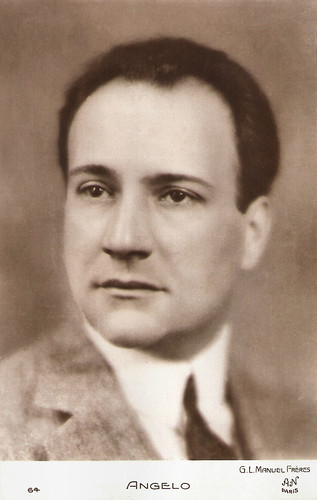
French postcard by A.N., Paris, no. 64, Photo: G.L. Manuel Frères.
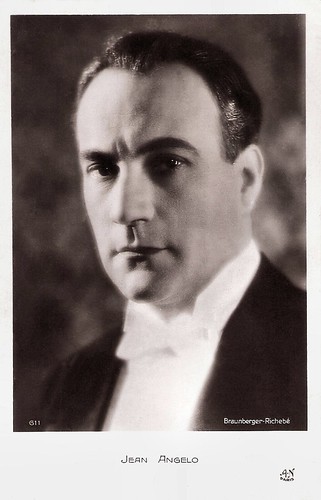
French postcard by A.N., Paris, no. 611, Photo: Braunberger / Richebé.
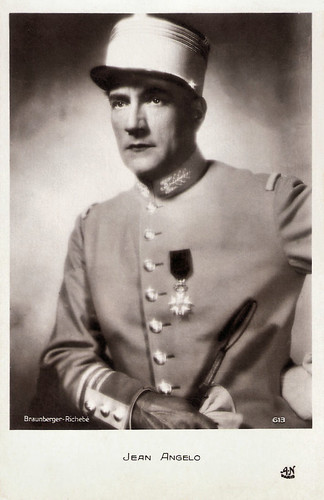
French postcard by A.N. Paris, no. 613. Photo: Braunberger / Richebé. Publicity still for L'homme qui assassina/The Man who killed (Kurt Bernhardt, Jean Tarride, 1931).
Scene from L'Atlantide (1921). Source: Astique 333 (YouTube).
Scenes from Nana (1926). Music: Bando da Lua (1938). Source: Radio Santos (YouTube).
Sources: Simon Benattar-Bourgeay (Ciné-Artistes - French), James Travers (French Films), Sandra Brennan (AllMovie), Wikipedia (French), and IMDb.
No comments:
Post a Comment